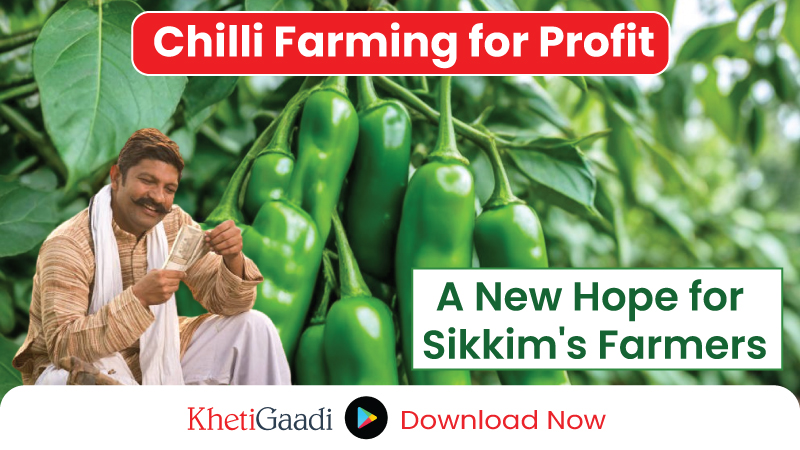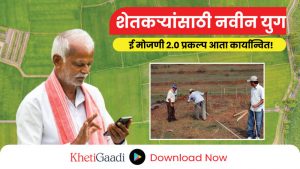Introduction to Traditional Farming in the Sikkim Himalayas
In the Sikkim Himalayas, the indigenous Lepcha people of the Dzongu region, known as the Lepcha heartland, rely on traditional organic farming practices. Their approach to agriculture is chemical-free and rainfed, rooted in preserving traditional forest-based agro-ecology. While these methods support their daily livelihoods, they often lead to limited farm profitability due to challenges like heavy weed infestation and the labour-intensive nature of organic farming in the region’s steep terrain.
KhetiGaadi always provides right tractor information
Challenges in Organic Farming
The Sikkim Himalayas receive over 3000 mm of rainfall annually, which contributes to heavy weed growth, a major challenge for organic farming. The reliance on bulky organic manures and bio-fertilizers as the sole alternatives to traditional farmyard manure adds to the labor demands, making it difficult for farmers in remote areas like Dzongu to sustain productivity. As a result, there has been a significant decline in seasonal crop yields and farm profitability. This decline has also impacted the younger generation’s interest in farming, making it crucial to introduce modern agricultural technologies and high-yielding varieties to revitalize the sector.
If you wish to know organic methods to increase your overall cultivation yield, please call KhetiGaadi counsellor on 07875114466 or write an email to connect@khetigaadi.com
Modern Agricultural Techniques
To address these challenges, the ICAR-North Eastern Hill Region, Sikkim Centre, in collaboration with the Department of Horticulture, Government of Sikkim, launched a technology demonstration program in early 2021 under the Tribal Sub Plan. Over the past three years, the program has involved around 237 farmers from the Lingdong-Barfok, Hee-Gyathang, Gnon-Sangdong, and Lum Gor Sangtok GPU areas in Dzongu, focusing on organic chilli cultivation.
Advanced Cultivation Practices
The program introduced breeder seeds of two chilli varieties—Arka Meghana and Arka Sweta—both known for their resistance to diseases like powdery mildew and mosaic virus. Farmers were also encouraged to use a foliar application of liquid seaweed extract (IFFCO-Sagarika) derived from red and brown algae to enhance plant growth at various stages. To combat weed growth, plastic mulching was used, which not only suppressed weeds but also conserved soil moisture during post-monsoon months.
Farmers followed all recommended organic crop production practices under regular monitoring by ICAR and local officials. The application of vermi-compost before transplanting, coupled with optimal plant spacing, led to a flowering period starting in June, with harvesting continuing up to mid-October. The average number of pickings ranged from three to six times, with market prices for the chilli ranging between Rs. 100-120 per kg.
Significant Increase in Farm Profitability
The results of the program were promising. The foliar application of IFFCO-Sagarika nearly doubled the fresh weight of mulched chilli harvests compared to traditional practices. This improvement in yield led to high profitability for the tribal Lepcha farmers of Lower Dzongu. The introduction of mulching technology reduced labor investment in intercultural operations and conserved soil moisture during winter, further enhancing farm efficiency.
Impact on Local Farmers and Community
The economic benefits extended beyond individual farmers, inspiring neighboring farmers in adjacent villages of Dzongu to adopt similar practices. The success of the program, particularly in the Mangan market, where farmers like Mr. Pempa Tshering Lepcha and Mr. Tshering Ongden Lepcha achieved high benefit-cost ratios, highlighted the potential for increased farm profitability. However, challenges like poor road connectivity and limited market demand in areas like the Dikchu market affected profitability for some farmers.
Stay tuned https://www.whatsapp.com/channel/0029Va6xEd91SWt5WHBNhS45with us on our WhatsApp channel for more real time updates on various agriculture related schemes and innovative cultivation methods aimed at supporting our hardworking farmers.
For more detailed information, visit https://khetigaadi.com/ regularly!
To know more about tractor price contact to our executive






